_A talk given at the [Shadow Libraries](http://www.sgt.gr/eng/SPG2096/)
symposium held at the National Museum of Contemporary Art (EMST) in
[Athens](/Athens "Athens"), 17 March 2018. Moderated by [Kenneth
Goldsmith](/Kenneth_Goldsmith "Kenneth Goldsmith") (UbuWeb) and bringing
together [Dusan Barok](/Dusan_Barok "Dusan Barok") (Monoskop), [Marcell
Mars](/Marcell_Mars "Marcell Mars") (Public Library), [Peter
Sunde](/Peter_Sunde "Peter Sunde") (The Pirate Bay), [Vicki
Bennett](/Vicki_Bennett "Vicki Bennett") (People Like Us), [Cornelia
Sollfrank](/Cornelia_Sollfrank "Cornelia Sollfrank") (Giving What You Don't
Have), and Prodromos Tsiavos, the event was part of the _[Shadow Libraries:
UbuWeb in Athens](http://www.sgt.gr/eng/SPG2018/) _programme organised by [Ilan
Manouach](/Ilan_Manouach "Ilan Manouach"), Kenneth Goldsmith and the Onassis
Foundation._
This is the first time that I was asked to talk about Monoskop as a _shadow
library_.
What are shadow libraries?
[Lawrence Liang](/Lawrence_Liang "Lawrence Liang") wrote a think piece for _e-
flux_ a couple of years ago,
in response to the closure of Library.nu, a digital library that had operated
from 2004, first as Ebooksclub, later as Gigapedia.
He wrote that:
[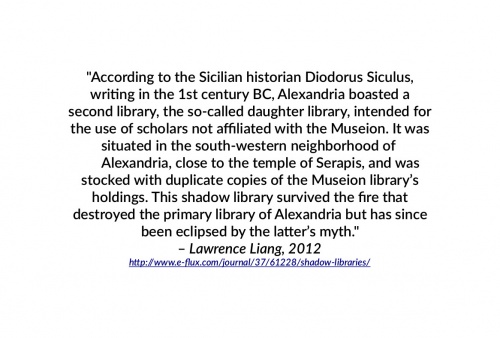](http://www.e-flux.com/journal/37/61228
/shadow-libraries/)
In the essay, he moves between identifying Library.nu as digital Alexandria
and as its shadow.
In this account, even large libraries exist in the shadows cast by their
monumental precedessors.
There’s a lineage, there’s a tradition.
Almost everyone and every institution has a library, small or large.
They’re not necessarily Alexandrias, but they strive to stay relevant.
Take the University of Amsterdam where I now work.
University libraries are large, but they’re hardly _large enough_.
The publishing market is so huge that you simply can’t keep up with all the
niche little disciplines.
So either you have to wait days or weeks for a missing book to be ordered
somewhere.
Or you have some EBSCO ebooks.
And most of the time if you’re searching for a book title in the catalogue,
all you get are its reviews in various journals the library subscribes to.
So my colleagues keep asking me.
Dušan, where do I find this or that book?
You need to scan through dozens of texts, check one page in that book, table
of contents of another book, read what that paper is about.
[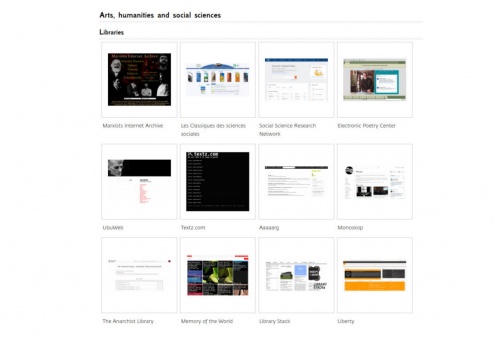](/Digital_libraries#Libraries
"Digital libraries#Libraries")
Or scrapes it from somewhere, since most books today are born digital and live
their digital lives.
...
Digital libraries need to be creative.
They don’t just preserve and circulate books.
[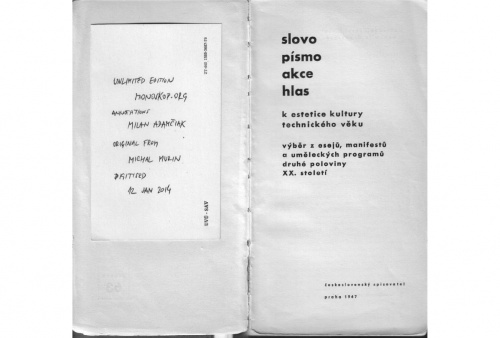](https://monoskop.org/log/?p=10262)
They engage in extending print runs, making new editions, readily
reproducible, unlimited editions.
[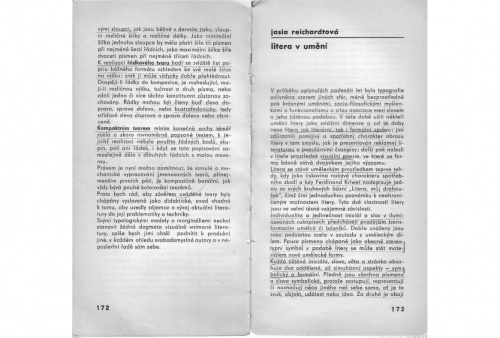](https://monoskop.org/images/d/de/Hirsal_Josef_Groegerova_Bohumila_eds_Slovo_pismo_akce_hlas.pdf#page=87)
This one comes with something extra. Isn’t this beautiful? You can read along
someone else.
In this case we know these annotations come from the Slovak avant-garde visual
poet and composer [Milan Adamciak](/Milan_Adamciak "Milan Adamciak").
[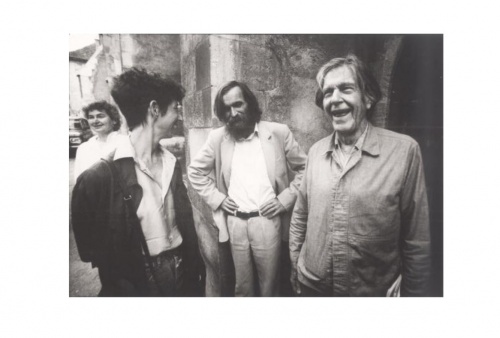](/Milan_Adamciak
"Milan Adamciak")
...standing in the middle.
A couple of pages later...
[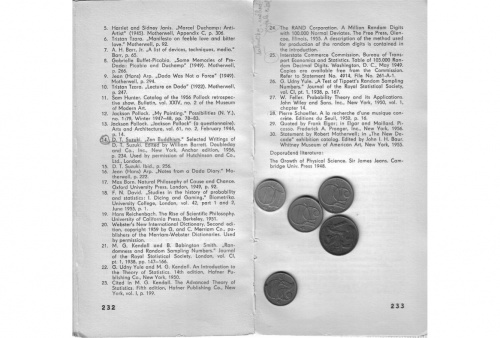](https://monoskop.org/images/d/de/Hirsal_Josef_Groegerova_Bohumila_eds_Slovo_pismo_akce_hlas.pdf#page=117)
...you can clearly see how he found out about a book containing one million
random digits [see note 24 on the image]. The strangest book.
[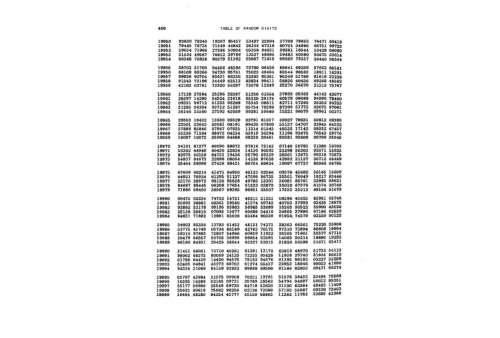](https://monoskop.org/log/?p=5780)
He was still alive when we put it up on Monoskop, and could experience it.
...
Digital libraries may seem like virtual, grey places, nonplaces.
But these little chance encounters happen all the time there.
There are touches. There are traces. There are many hands involved, visible
hands.
They join writers’ hands and help creating new, unlimited editions.
They may be off Google, but for many, especially younger generation these are
the places to go to learn, to share.
Rather than in a shadow, they are out in the open, in plain sight.
[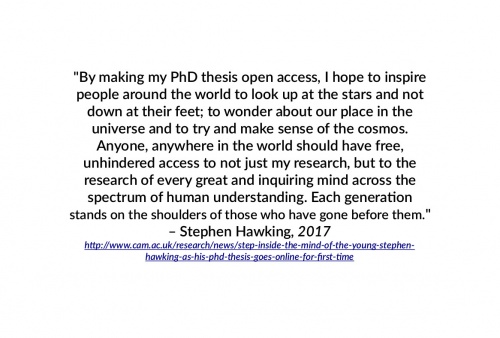](http://www.cam.ac.uk/research/news
/step-inside-the-mind-of-the-young-stephen-hawking-as-his-phd-thesis-goes-
online-for-first-time)
This made rounds last year.
As scholars, as authors, we have reasons to have our works freely accessible
by everyone.
We do it for feedback, for invites to lecture, for citations.
Sounds great.
So when after long two, three, four, five years I have my manuscript ready,
where will I go?
Will I go to an established publisher or an open access press?
Will I send it to MIT Press or Open Humanities Press?
Traditional publishers have better distribution, and they often have a strong
brand.
It’s often about career moves and bios, plans A’s and plan B’s.
There are no easy answers, but one can always be a little inventive.
In the end, one should not feel guilty for publishing with MIT Press.
But at the same time, one should neither feel guilty for scanning and sharing
such a book with others.
...
You know, there’s fighting, there are court cases.
[Aaaaarg](/Aaaaarg "Aaaaarg"), a digital library run by our dear friend [Sean
Dockray](/Sean_Dockray "Sean Dockray"), is facing a Canadian publisher.
Open Library is now facing the Authors Guild for lending scanned books
deaccessioned from libraries.
They need our help, our support.
But collisions of interests can be productive.
This is what our beloved _Cabinet_ magazine did when they found their PDFs
online.
They converted all their articles into HTML and put them online.
The most beautiful takedown request we have ever received.
[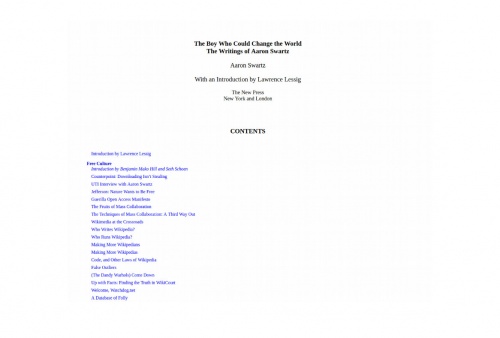](https://monoskop.org/log/?p=16598)
So what is at stake? What are these digital books?
They are poor versions of print books.
They come with no binding, no paper, no weight.
They come as PDFs, EPUBs, JPEGs in online readers, they come as HTML.
By the way, HTML is great, you can search it, copy, save it, it’s lightweight,
it’s supported by all browsers, footnotes too, you can adapt its layout
easily.
That’s completely fine for a researcher.
As a researcher, you just need source code:
you need plain text, page numbers, images, working footnotes, relevant data
and code.
_Data and code_ as well:
this is where online companions to print books come in,
you want to publish your research material,
your interviews, spreadsheets, software you made.
...
Here we distinguish between researchers and readers.
As _readers_ we will always build our beautiful libraries at home, and
elsewhere,
filled with books and... and external harddrives.
...
There may be _no contradiction_ between the existence of a print book in
stores and the existence of its free digital version.
So what we’ve been asking for is access, basic access. The access to culture
and knowledge for research, educational, noncommercial purposes. A low budget,
poor bandwidth access. Access to badly OCR’d ebooks with grainy images. Access
to culture and knowledge _light_.
Thank you.
Dusan Barok
_Written on 16-17 March 2018 in Athens and Amsterdam. Published online on 21
March 2018._
Goldsmith
UbuWeb at 15 Years An Overview
2011
# UbuWeb at 15 Years: An Overview
By [Kenneth Goldsmith](https://www.poetryfoundation.org/poets/kenneth-
goldsmith)
It's amazing to me that [UbuWeb](http://ubu.com), after fifteen years, is
still going. Run with no money and put together pretty much without
permission, Ubu has succeeded by breaking all the rules, by going about things
the wrong way. UbuWeb can be construed as the Robin Hood of the avant-garde,
but instead of taking from one and giving to the other, we feel that in the
end, we're giving to all. UbuWeb is as much about the legal and social
ramifications of its self-created distribution and
[archiving](http://www.poetryfoundation.org/harriet/2011/04/archiving-is-the-
new-folk-art/) system as it is about the content hosted on the site. In a
sense, the content takes care of itself; but keeping it up there has proved to
be a trickier proposition. The socio-political maintenance of keeping free
server space with unlimited bandwidth is a complicated dance, often interfered
with by darts thrown at us by individuals calling foul-play on copyright
infringement. Undeterred, we keep on: after fifteen years, we're still going
strong. We're lab rats under a microscope: in exchange for the big-ticket
bandwidth, we've consented to be objects of university research in the
ideology and practice of radical distribution.
But by the time you read this, UbuWeb may be gone. Cobbled together, operating
on no money and an all-volunteer staff, UbuWeb has become the unlikely
definitive source for all things avant-garde on the internet. Never meant to
be a permanent archive, Ubu could vanish for any number of reasons: our ISP
pulls the plug, our university support dries up, or we simply grow tired of
it. Acquisition by a larger entity is impossible: nothing is for sale. We
don't touch money. In fact, what we host has never made money. Instead, the
site is filled with the detritus and ephemera of great artists—[the music of
Jean Dubuffet](http://www.ubu.com/sound/dubuffet.html), [the poetry of Dan
Graham](http://www.ubu.com/aspen/aspen5and6/poem.html),[ Julian Schnabel’s
country music](http://ubu.com/sound/schnabel.html), [the punk rock of Martin
Kippenberger](http://ubu.com/sound/kippenberger.html), [the diaries of John
Lennon](http://www.ubu.com/aspen/aspen7/diary.html), [the rants of Karen
Finley](http://www.ubu.com/sound/uproar.html), and [pop songs by Joseph
Beuys](http://www.ubu.com/film/beuys_sonne.html)—all of which was originally
put out in tiny editions and vanished quickly.
However the web provides the perfect place to restage these works. With video,
sound, and text remaining more faithful to the original experience than, say,
painting or sculpture, Ubu proposes a different sort of revisionist art
history, one based on the peripheries of artistic production rather than on
the perceived, or market-based, center. Few people, for example, know that
Richard Serra makes videos. Whilst visiting his recent retrospective at The
Museum of Modern Art in New York, there was no sign of [TELEVISION DELIVERS
PEOPLE](http://www.ubu.com/film/serra_television.html) (1973) or
[BOOMERANG](http://www.ubu.com/film/serra_boomerang.html) (1974), both being
well-visited resources on UbuWeb. Similarly, Salvador Dali’s obscure video,
[IMPRESSIONS DE LA HAUTE MONGOLIE—HOMMAGE Á RAYMOND
ROUSSEL](http://www.ubu.com/film/dali_impressions.html) from the mid-70s can
be viewed. Outside of UN CHIEN ANDALOU (1929), it’s the only other film he
completed in his lifetime. While you won’t find reproductions of Dali’s
paintings on UbuWeb, you will find [a 1967 recording of an advertisement he
made for a bank.](http://ubumexico.centro.org.mx/sound/dali_salvador/Dali-
Salvador_Apoth-du-dollar_1967.mp3)
It’s not all off-beat: there is, in all fairness, lots of primary expressions
of artists’ works which port to the web perfectly: [the films of Hollis
Frampton](http://ubu.com/film/frampton.html), [readings by Alain Robbe-
Grillet](http://www.ubu.com/aspen/aspen5and6/audio5B.html#jealousy), [Samuel
Beckett radio plays](http://www.ubu.com/sound/beckett.html), [the concrete
poems of Mary Ellen Solt](http://ubu.com/historical/solt/index.html), [the
writings of Maurice Blanchot](http://ubu.com/ubu/blanchot_last_man.html) and
the [music of Meredith Monk](http://www.ubu.com/sound/monk.html), to name a
few.
UbuWeb began in 1996 as a site focusing on visual and concrete poetry. With
the advent of the graphical web browser, we began scanning old concrete poems,
astonished by how fresh they looked backlit by the computer screen. Shortly
thereafter, when streaming audio became available, it made sense to extend our
scope to sound poetry, and as bandwidth increased we later added MP3s as well
as video. Sound poetry opened up a whole new terrain: certain of [John Cage’s
readings](http://www.ubu.com/sound/cage.html) of his mesostic texts could be
termed “sound poetry,” hence we included them. As often, though, Cage combined
his readings with an orchestral piece; we included those as well. But soon, we
found ourselves unable to distinguish the difference between “sound poetry”
and “music.” We encountered this dilemma time and again whether it was with
the compositions of [Maurico Kagel](http://www.ubu.com/sound/kagel.html),
[Joan La Barbara](http://www.ubu.com/sound/lab.html), or [Henri
Chopin](http://www.ubu.com/sound/chopin.html), all of whom are as well-known
as composers as they are sound artists. After a while, we gave up trying to
name things; we dropped the term “sound poetry” and referred to it thenceforth
simply as “[Sound](http://www.ubu.com/sound/index.html).”
When we began posting [found street
poems](http://www.ubu.com/outsiders/ass.html) that used letter forms in
fantastically innovative ways, we had to reconsider what “concrete poetry”
was. As time went on, we seemed to be outgrowing our original taxonomies until
we simply became a repository for the “avant-garde” (whatever that means—our
idea of what is “avant-garde” seems to be changing all the time). UbuWeb
adheres to no one historical narrative, rather we’re more interested in
putting several disciplines into the same space and seeing how they interact:
poetry, music, film, and literature from all periods encounter and bounce off
of each other in unexpected ways.
In 2005, we acquired a collection called [The 365 Days
Project](http://www.ubu.com/outsiders/365/index.shtml), a year’s worth of
outrageous MP3s that can be best described as celebrity gaffs, recordings of
children screeching, how-to records, song-poems, propagandistic religious
ditties, spoken word pieces, even ventriloquist acts. However, buried deep
within The 365 Days Project were rare tracks by the legendary avant-gardist
[Nicolas Slonimsky](http://www.ubu.com/outsiders/365/2003/070.shtml), an
early-to-mid-twentieth century conductor, performer, and composer belting out
advertisements and children’s ditties on the piano in an off-key voice. UbuWeb
had already been hosting historical recordings from the 1920s he
[conducted](http://www.ubu.com/sound/slonimsky.html) of [Charles
Ives](http://ubumexico.centro.org.mx/sound/slonimsky_nicolas/Slonimsky-
Nicolas_02_Ives-Barn-Dance.mp3), [Carl
Ruggles](http://www.ubu.com/sound/agp/AGP167.html), and [Edgard
Varèse](http://ubumexico.centro.org.mx/sound/slonimsky_nicolas/Slonimsky-
Nicolas_01_Varese-Ionisation.mp3) in our Sound section, yet nestled in amongst
oddballs like [Louis Farrakhan singing
calypso](http://www.ubu.com/outsiders/365/2003/091.shtml) or high school
choir’s renditions of “[Fox On The
Run](http://blogfiles.wfmu.org/DP/2003/01/365-Days-Project-01-04-dondero-high-
school-a-capella-choir-fox-on-the-run-1996.mp3),” Slonimsky fit into both
categories—high and low—equally well.
A few years back, Jerome Rothenberg, the leading scholar of
[Ethnopoetics](http://ubu.com/ethno/), approached us with an idea to include a
wing which would feature Ethnopoetic sound, visual art, poetry, and essays.
Rothenberg’s interest was specific to UbuWeb: how the avant-garde dovetailed
with the world’s deep cultures—those surviving in situ as well as those that
had vanished except for transcriptions in books or recordings from earlier
decades. Sound offerings include everything from [Slim
Gaillard](http://ubu.com/ethno/soundings/gaillard.html) to [Inuit throat
singing](http://ubu.com/ethno/soundings/inuit.html), each making formal
connections to modernist strains of [Dada](http://www.ubu.com/sound/dada.html)
or [sound poetry](http://ubu.com/sound/poesia_sonora.html). Likewise, the
Ethnopoetic visual poetry section ranges from [Chippewa song
pictures](http://ubu.com/ethno/visuals/chip.html) to [Paleolithic
palimpsests](http://ubu.com/ethno/visuals/paleo.html) to [Apollinaire’s
Calligrammes](http://ubu.com/historical/app/index.html) (1912–18) There are
dozens of papers with topics like “[Louis Armstrong and the Syntax of
Scat](http://ubu.com/ethno/discourses/syntax_of_scat.doc)” to [Kenneth
Rexroth’s writings on American Indian
song](http://ubu.com/ethno/discourses/rexroth_indian.html).
There are over 2500 full-length avant-garde films and videos, both streaming
and downloadable, including the videos of [Vito
Acconci](http://www.ubu.com/film/acconci.html) and the filmic oeuvre of [Jack
Smith](http://www.ubu.com/film/smith_jack.html), You can also find several
biographies and interviews with authors such as [Jorge Luis
Borges](http://www.ubu.com/film/borges.html),[ J. G.
Ballard](http://www.ubu.com/film/ballard.html), [Allen
Ginsberg](http://www.ubu.com/film/ginsberg.html), and [Louis-Ferdinand
Céline](http://www.ubu.com/film/celine.html). And there are a number of films
about avant-garde music, most notably [Robert
Ashley](http://www.ubu.com/sound/ashley.html)’s epic 14-hour [Music with Roots
in the Aether](http://www.ubu.com/film/aether.html), a series of composer
portraits made in the mid-70s featuring artists such as [Pauline
Oliveros](http://www.ubu.com/film/oliveros.html), [Philip
Glass](http://www.ubu.com/film/glass_aether.html), and [Alvin
Lucier](http://www.ubu.com/film/aether.html). A dozen of the rarely screened
films by [Mauricio Kagel](http://www.ubu.com/film/kagel.html) can be viewed as
can [Her Noise](http://www.ubu.com/film/her_noise.html), a documentary about
women and experimental music from 2005. There are also hours of performance
documentation, notably the entire [Cinema of
Transgression](http://www.ubu.com/film/transgression.html) series with films
by [Beth B](http://www.ubu.com/film/b.html) and [Richard
Kern](http://www.ubu.com/film/kern.html), a lecture by [Chris
Burden](http://www.ubu.com/film/burden.html), a bootleg version of [Robert
Smithson’s HOTEL PALENQUE](http://www.ubu.com/film/smithson.html), (1969) and
an astonishing [21-minute clip of Abbie Hoffman making gefilte
fish](http://www.ubu.com/film/hoffman.html) on Christmas Eve of 1973.
Other portions of the site include a vast repository of papers about audio,
performance, conceptual art, and poetry. There are large sections of artists
simply placed together under categories of Historical and Contemporary. And
then there is [/ubu Editions](http://www.ubu.com/ubu/), which offers full-
length PDFs of literature and poetry. Among the 73 titles, authors include Tim
Davis, Ron Silliman, Maurice Blanchot, Caroline Bergvall, Claude Simon, Jeremy
Sigler, Severo Sarduy, and Juliana Spahr. And finally there is a [Conceptual
Writing](http://ubu.com/concept/index.html) wing which highlights contemporary
trends in poetry as well as its historical precedents.
How does it all work? Most importantly, UbuWeb functions on no money: all work
is done by volunteers. Our server space and bandwidth is donated by several
universities, who use UbuWeb as an object of study for ideas related to
radical distribution and gift economies on the web. In terms of content, each
section has an editor who brings to the site their area of expertise. Ubu is
constantly being updated but the mission is different from the flotsam and
jetsam of a blog; rather, we liken it to a library which is ever-expanding in
uncanny—and often uncategorizable—directions. Fifteen years into it, UbuWeb
hosts over 7,500 artists and several thousand works of art. You’ll never find
an advertisement, a logo, or a donation box. UbuWeb has always been and will
always be free and open to all.
The future is eminently scalable: as long as we have the bandwidth and server
space, there is no limit as to how big the site can grow. For the moment, we
have no competition, a fact we’re not happy about. We’re distressed that there
is only one UbuWeb: why aren’t there dozens like it? Looking at the art world,
the problem appears to be a combination of an adherence to an old economy (one
that is working very well with a booming market) and sense of trepidation,
particularly in academic circles, where work on the internet is often not
considered valid for academic credit. As long as the art world continues to
prize economies of scarcity over those based on plentitude, the change will be
a long time coming. But UbuWeb seeks to offer an alternative by invoking a
gift economy of plentitude with a strong emphasis on global education. We’re
on numerous syllabi, ranging from kindergarteners studying pattern poetry to
post graduates listening to hours of Jacques Lacan’s
[Séminaires](http://www.ubu.com/sound/lacan.html).
And yet . . . it could vanish any day. Beggars can’t be choosers and we gladly
take whatever is offered to us. We don’t run on the most stable of servers or
on the swiftest of machines; hacks and crashes eat into the archive on a
periodic basis; sometimes the site as a whole goes down for days; occasionally
the army of volunteers dwindles to a team of one. But that’s the beauty of it:
UbuWeb is vociferously anti-institutional, eminently fluid, refusing to bow to
demands other than what we happen to be moved by at a specific moment,
allowing us flexibility and the ability to continually surprise our audience .
. . and even ourselves.
Originally Published: April 26th, 2011
Kenneth Goldsmith's writing has been called some of the most "exhaustive and
beautiful collage work yet produced in poetry" by _Publishers Weekly._
Goldsmith is the author of eight books of poetry, founding editor of the
online archive UbuWeb (http://ubu.com), and the editor _I 'll Be Your Mirror:
The Selected Andy Warhol..._